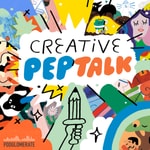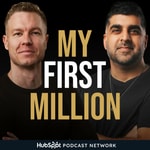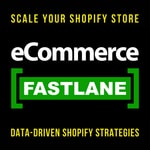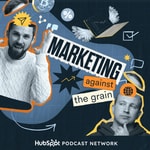Drowned in Sound – Détails, épisodes et analyse
Détails du podcast
Informations techniques et générales issues du flux RSS du podcast.

Drowned in Sound
Drowned in Sound
Fréquence : 1 épisode/83j. Total Éps: 44

Classements récents
Dernières positions dans les classements Apple Podcasts et Spotify.
Apple Podcasts
Aucun classement récent disponible
Spotify
Aucun classement récent disponible
Liens partagés entre épisodes et podcasts
Liens présents dans les descriptions d'épisodes et autres podcasts les utilisant également.
See all- https://openai.com/blog/chatgpt/
202 partages
- https://kk.org/thetechnium/1000-true-fans/
172 partages
- https://hemingwayapp.com/
68 partages
- https://www.instagram.com/eli1ah
20 partages
- https://www.instagram.com/seaninsound
17 partages
- https://www.instagram.com/monaeltahawy
8 partages
- https://twitter.com/ystrickler
13 partages
- https://twitter.com/laurakaykelly
6 partages
- http://twitter.com/seaninsound
6 partages
Qualité et score du flux RSS
Évaluation technique de la qualité et de la structure du flux RSS.
See allScore global : 68%
Historique des publications
Répartition mensuelle des publications d'épisodes au fil des années.
How to Start a DIY Music Business Before You Feel Ready - Girls Twiddling Knobs on Mission Driven Music Careers
Saison 3 · Épisode 15
mardi 22 juillet 2025 • Durée 59:52
What if the very thing that makes you feel like an outsider in the music industry could become your greatest business advantage? How do you build something meaningful when you're convinced you're not qualified? And why might starting before you feel "ready" be the secret to creating lasting change?
This week, Sean talks with Isobel Anderson - founder of Girls Twiddling Knobs, one of music tech's most important feminist voices. Following on from the Mary Spender episode about converting online reach into sustainable income, this conversation explores a different path: how small, mission-driven businesses can create industry change without needing massive audiences.
From a PhD in Sonic Arts to over 25 million Spotify streams to building Girls Twiddling Knobs into one of music tech's most important feminist voices, reaching thousands of women through courses, community, and her acclaimed podcast, Isobel's journey proves that feeling like an imposter might actually be your qualification.
In essence, this episode is about turning industry frustrations into business opportunities, why multiple revenue streams are now reality for musicians, and how to value your work when the world expects creativity for free.
Chapters:
00:00 – Sean's Introduction: Building Your Independent Music Business 02:41 – Isobel Anderson intro: From Singer-Songwriter to Sonic Arts PhD 08:12 – Why Sound Design and Production Details Matter 10:08 – Confronting Misogyny in the Music Industry 20:05 – From Facebook Group to Girls Twiddling Knobs 24:41 – Overcoming Self-Doubt When Learning Something New 30:46 – Why Great Producers Are More Than Technical Experts 33:48 – Valuing Your Work and Putting a Price on Creativity 46:40 – Are Musicians as Vital to Society as Doctors? 49:37 – Balancing Music-Making with Building a Business 55:54 – Sean's Outro Reflections Key Takeaways:
- The 10% Edge: You don't need to be an expert to start teaching others - you just need to be one step ahead of the people you want to help.
- Start Before You're Ready: "You are not going to ever be ready to do this" - perfectionism is the enemy of progress.
- Mission Before Money: Purpose-driven businesses can be more disruptive than charities because they can make quick decisions and restructure rapidly.
- Multiple Revenue Streams Are Reality: Modern music careers require diversified income - it's not a backup plan, it's the plan.
- Community Over Confidence: Building safe learning spaces can be more valuable than traditional "confidence training."
Continue the Conversation:
- Email sean@drownedinsound.org with your thoughts
- Join the discussion: Drowned in Sound Community
- Get more music insights: DiS Newsletter
Guest Links:
Referenced in Episode:
- The Anchoress - Artist managed by Sean
- Girls Twiddling Knobs special episode - The immersive episode Sean references
- Delia Derbyshire Day - Celebrating the electronic music pioneer
- The Oram Awards - Recognizing women innovating in music and sound technology
About the Host:
Sean Adams is the founder of Drowned in Sound and manages artists including Charlotte Church and The Anchoress. Beyond founding one of the original music blogs, he's worked with BBC 6 Music and co-produced political podcast The Trawl. Through the DiS podcast, he maps the future of music by exploring culture, politics, and the systems shaping how we create and consume music.
Note: This conversation originally took place a couple of years ago but feels more relevant than ever as musicians navigate the realities of building sustainable, independent careers. If this episode sparks any business ideas, we'd love to hear about them in three years' time.
Mary Spender - Why Now Is Actually The Greatest Time for Independent Musicians
Saison 3 · Épisode 14
dimanche 13 juillet 2025 • Durée 47:26
While most music industry coverage focuses on (poly)crisis and collapse, Mary Spender argues we're living through the greatest era for independent artists in history.
But, but but... what about streaming economics, venue closures, and platform dependence? Don't worry, we get into it.
With over 100 million YouTube views, 34,000 newsletter subscribers, and significant album sales achieved before releasing a single track to streaming, Mary demonstrates there are viable alternatives to industry doom-spiralling.
In this conversation, she reveals her strategies for converting YouTube viewers into album buyers, why artists need to think like entrepreneurs, and what she'd build with Spotify's $400 million Joe Rogan budget.
Sean also asks her about her recent video about why artists should embrace YouTube. Speaking of which, you will be able to see clips from this interview over on Drowned in Sound's YouTube: youtube.com/@DrownedinSound
Timestamps
00:00 Sean's Intro
03:21 What will music be like in 2050?
06:25 Why artists should think like entrepreneurs
12:45 What does the future hold for independent artists?
16:56 The 1000 true fan theory
18:51 Should YouTube be the #1 platform for musicians?
24:36 Researching with an open mind. A rare skillset?
29:45 How to convert an audience from YouTube
34:17 What can the UK government do for music?
36:35 How would Mary spend the $400 million Spotify paid Joe Rogan?
38:39 Is long-form content on the return?
43:29 Sean's Outro
Quotable Moments "Technically it's never been a better time to be a musician than today, even though everyone likes to talk about the heyday. But that was for a very lucky few." "If you don't have the grassroots, you don't have the artists in Wembley Stadium. Like you don't have that trajectory."
Continue the Conversation📧 Email sean@drownedinsound.org with your questions for future episodes🌐 Join the Drowned in Sound Community📰 Subscribe to the Drowned in Sound newsletter
Guest Links Mary Spender's YouTube Channel Mary's website and newsletter The Dire Straits Documentary on Nebula
Referenced in Episode Kevin Kelly's "1000 True Fans" essay
About the Host: Sean Adams is the founder of Drowned in Sound (est. 2000), manages artists including Charlotte Church and The Anchoress, and has worked with BBC 6 Music. Through this podcast, he maps the future of music by exploring culture, politics, and the systems shaping how we create and consume music. At its peak, Drowned in Sound had over 3 million readers. Stay tuned for details about its 25th anniversary celebrations.
The Report That Shook the Music Industry & Exposed Inequality
Saison 3 · Épisode 5
dimanche 16 mars 2025 • Durée 01:09:27
Why does gender bias still dominate radio airplay? And how did one data report force the industry to face its inequalities?
In this episode of the Drowned in Sound Podcast, Sean Adams talks to Linda Coogan Byrne, activist and music consultant behind the Why Not Her? campaign.
Her reports have exposed gender and racial disparities in radio airplay, driving real industry change.
This conversation reveals how data is power or as Linda puts it, “the data validates lived experiences.”
00:00 – Introduction: How One Report Changed Music 01:45 – Meet Linda Coogan Byrne & Her Data Reports 04:30 – The Shocking Gender Disparity in Radio 07:00 – Industry Reactions: Denial, Excuses & Pushback 11:00 – Thin Lizzy, Protest Billboards & Music Activism 15:30 – Has the Industry Improved or Is It Lip Service? 21:00 – Can Music Ever Be Equal? 30:00 – Why Not Everyone Can Be an Activist 38:00 – What Needs to Change for Lasting Equality? 45:00 – How Data Holds Power to Account 50:00 – Final Thoughts & Actionable Takeaways
Links
Why Not Her? Reports → https://whynother.eu/data-reports Gender Bias in UK Radio – The Guardian → https://www.theguardian.com/music/2020/aug/21/female-british-artists-underrepresented-on-uk-radio-survey-finds Book More Women (Festival Representation) → https://www.instagram.com/bookmorewomen/ Activist Recommendations:
- Mona Eltahawy → https://www.instagram.com/monaeltahawy
- Emma Dabiri - Don’t Touch My Hair → https://uk.bookshop.org/a/14603/9780141986289
- Mary Beard - Women & Power → https://uk.bookshop.org/a/14603/9781788160612
- Ijeoma Oluo - Mediocre → https://uk.bookshop.org/a/14603/9781529353839
- Check My Ads (Ad Funding & Misinformation) → https://checkmyads.org/
🗣 Discuss this episode over on the Drowned in Sound Community → https://community.drownedinsound.com/ 📩 Email Sean → sean@drownedinsound.org 🔵 Follow on Bluesky → https://bsky.app/profile/drownedinsound.bsky.social 📩 Get the DiS Newsletter → https://drownedinsound.org
ABOUT THE GUEST
Linda Coogan Byrne is a music industry consultant, publicist, and activist known for her gender & racial disparity data reports. She is the CEO of Good Seed PR and founder of Why Not Her?, a campaign pushing for cultural change in music. Her work has influenced radio airplay, festival bookings, and policy decisions. She has been named among the Top 100 Most Influential Women in Ireland, inducted into the Music Week Hall of Honour, and recognized by IMPALA as a Top 20 Woman in Music Activism.
ABOUT THE HOST
Sean Adams is the founder of Drowned in Sound, a pioneering music webzine launched in 2000. Beyond editorial work, he manages artists like Charlotte Church and The Anchoress, operates the DiS independent record label, and contributes to strategic music industry and political advocacy projects. His passion lies in championing diverse music scenes and supporting artists worldwide.
How Do We Save Our Music Scenes? Meet Sound Diplomacy’s Shain Shapiro
Saison 3 · Épisode 4
dimanche 2 mars 2025 • Durée 40:03
What makes a great music city? How do governments, venues, and fans keep local music scenes alive? And why is music still not treated as an essential part of a city’s economy?
In this episode of the Drowned in Sound Podcast, Sean Adams speaks with Shain Shapiro, founder of Sound Diplomacy and a leading advocate for integrating music into urban policy. Shain has advised cities and governments worldwide on how to invest in music, build better infrastructure, and ensure that artists and venues don’t just survive but thrive.
The future of music scenes isn’t just about artists - it’s about infrastructure, investment, and policy. Without real change, we risk losing the cultural spaces that make music thrive.
Topics Covered:
The future of music cities: Why local scenes are vital and how they can be protected
Music as an economic and public good: Why governments should treat music like any other essential sector
Emerging music markets: Where the global music hotspots of the future might be
Live Nation: How monopolies shape local music ecosystems
The importance of local media and community spaces in sustaining music scenes
How cities can future-proof music amid climate, economic, and technological shifts
Shain Shapiro explains: “We don’t make data-driven decisions about music the way we do about transit, healthcare, or housing, yet music is an essential part of a city’s fabric.”
Episode Highlights & Timestamps:
00:00 – Introduction: Can We Save Our Music Scenes?
01:04 – The Future of Music: What Will 2050 Sound Like?
02:33 – The Big Challenges Facing the Music Industry
04:44 – Music as an Economic & Public Good: Why Governments Should Care
09:11 – Shain’s Journey: From Record Shops to Global Music Policy
14:08 – Music Cities: How Governments Can Invest in Local Scenes
19:51 – Global Music Growth: Why Africa & Southeast Asia Are the Future
28:25 – Community & Local Government’s Role in Music Sustainability
35:50 – The Live Nation Monopoly, Local Media, & How Cities Can Push Back
40:00 – Final Thoughts: What Needs to Change & What Fans Can Do
Further Reading & Resources:
Sound Diplomacy – Leading global consultancy on music and city planning
Making Places Better Newsletter – Shain Shapiro’s insights on improving urban spaces through music and culture
Music Venue Trust – Protecting grassroots venues
Cardiff Music Strategy – A model for city-led music investment
Fonds de la Musique Canada – Canada’s funding model for music exports
Live DMA – European network for live music venues
Join the discussion on the Drowned in Sound Community, message me on Bluesky, or email me at sean@drownedinsound.org.
Get More Music Insights – Subscribe to the Drowned in Sound Newsletter for deep dives into the future of music.
About the Host:
Sean Adams is the founder of Drowned in Sound, established in 2000 as a pioneering music webzine. Beyond his editorial work, Sean manages artists such as Charlotte Church and The Anchoress, operates the DiS independent record label, and contributes to strategic communications for music initiatives like Music Venue Trust. His passion lies in championing diverse music scenes and supporting artists across genres.
About the Guest:
Shain Shapiro, PhD is the founder and executive chairman of Sound Diplomacy, the leading global consultancy on music and city planning. He also serves as the executive director of the not-for-profit Center for Music Ecosystems. Shain has authored This Must Be The Place: How Music Can Make Your City Better, exploring the intersection of music and urban development. His work has influenced over 130 cities worldwide to invest in music and culture, redefining the value of music in urban settings.
Festivals For Future: Frances Fox on Music’s Role in Climate Justice
Saison 3 · Épisode 3
dimanche 23 février 2025 • Durée 01:05:32
Music has long been a force for change but as extreme weather disrupts events and the industry grapples with its own environmental footprint, can music be a meaningful part of the climate justice movement?
In episode 2 of season 3 of the Drowned in Sound Podcast, Sean Adams speaks with Frances Fox, founder of Climate Live and a leader in the UK’s youth climate strikes.
Frances shares her journey from music fan to activist, why festivals are powerful spaces for engagement, and how the music industry can move beyond greenwashing to drive real action.
This episode explores:
Why festivals are at risk from the climate crisis
How music fans can help shape the climate conversation
The role of artists, venues & labels in pushing for a sustainable future
The reality of music’s carbon footprint and what needs to change
The Solar-Powered Pink Bus—and why Climate Live is taking a message of climate justice straight to festival crowds whilst applying glitter and temporary tattoos
From touring impacts to activism strategies, this episode breaks down the intersection of music and climate justice, offering real insights into what fans, artists, and the industry can do next.
“Engaging the unengaged is my jam—when you meet people where they're at, like at a festival, it's very chill.”
– Frances Fox
Episode Highlights:
00:00 – Introduction: Can Music Be a Force for Climate Justice?05:00 – Frances Fox’s Journey: From Festival-Goer to Climate Activist09:20 – Festivals & Climate Change: How Extreme Weather Is Reshaping Live Music15:40 – Touring, Vinyl & Streaming: The Hidden Environmental Cost of Music22:00 – The Solar-Powered Pink Bus: Taking Climate Conversations to Festivals30:00 – Roles in the Resistance: How Fans & Artists Can Push for Industry Change40:00 – Call to Action: What’s Next & How Listeners Can Get Involved
Further Reading & Resources:
Climate Live – Join the movement and apply to perform
Fridays for Future – Global climate strike movement
Choked Up – Campaigning for air quality in marginalized communities
Disha Ravi – Indian climate activist's Wiki
Roles in the Resistance Poster – Find your place in climate activism
Julie's Bicycle – Sustainability in the creative arts
Tori Tsui – Climate activist and author of It's Not Just You
Dominique Palmer – Climate activist and speaker
Music Declares Emergency – Musicians demanding climate action
Music Venue Trust – Protecting grassroots music venues
Safe Gigs for Women – Creating safer environments for women at gigs
Teach The Future - teachthefuture.uk
Rozzi - Artist who wrote a song about LA fires
Stop Rosebank – Campaign against new oil fields
Fossil Fuel Non-Proliferation Treaty – Ending fossil fuel expansion
EarthPercent – Brian Eno’s initiative for climate funding
Make My Money Matter – How your bank funds fossil fuels
Rainforest Foundation UK – Protecting the Congo Basin
Reverb – Eco-friendly music tours
Massive Attack's Climate Initiatives – Band's efforts for sustainable festivals
📩 Get More Music Insights – Subscribe to the Drowned in Sound Newsletter for deep dives into the future of music: http://drownedinsound.org
🎵 Music by SoundMirror
Why This Matters:
Festivals are already being disrupted—Boardmasters, Standon Calling, and others have faced cancellations due to extreme weather, and independent festivals may not survive rising insurance costs.
The music industry still relies on fossil fuels—From plastic-heavy vinyl production to major labels backed by oil & gas investments, there’s a deeper connection than many realise.
Musicians & fans have power—From sustainable touring to rethinking sponsorships, music can lead the way—but only if more people demand change.
How We Open Music’s Doors to Everyone (Not Just the Rich)
Saison 3 · Épisode 2
dimanche 16 février 2025 • Durée 45:49
From grassroots venues and youth music programs to Mercury Prize winners, early support shapes who gets to make music—and who doesn’t. But is access to music a right or a privilege?
Music should be for everyone - but is it becoming a luxury only the privileged can afford?
Episode one of season 3 of the DiS podcast, explores how Youth Music -a UK charity funding grassroots projects - is fighting to create fairer opportunities for young musicians facing financial, social, and industry barriers.
In this episode of the Drowned in Sound Podcast, Sean Adams speaks with Matt Griffiths, CEO of Youth Music, about hidden inequalities in the music industry and the work being done to create opportunities for the next generation of musicians.
From youth-led projects and grassroots funding to the systemic barriers keeping working-class musicians out, this episode explores how music’s future can be more inclusive, diverse, and fair.
This episode also features Ezra Collective’s Mercury Prize-winning speech, where they credit their success to the support they received early on:
“This is not just Ezra Collective’s moment, this is a moment for every single organisation that’s championing young people making music.”
Read the full speech here:The Line of Best Fit
The Drowned in Sound Podcast maps the future of music and explores what's happening in the industry right now, with a strong moral compass. It connects music, culture, and ethics, offering deep dives into the issues shaping the way we create, consume, and sustain music.
Why This Matters:
Music has the power to change lives - but only if everyone has the chance to participate. Rising costs, funding cuts, and industry gatekeeping are making it harder than ever for working-class musicians to break through. In this episode, we explore what’s at stake, what’s changing, and how we can fight for a better future in music.
Topics Covered:
- Why music is increasingly a career for the privileged
- From youth projects to Mercury Prizes: why access matters
- How the industry is shutting out working-class talent
- The critical role of Youth Music in opening doors
- The funding crisis: why 25% of grassroots projects are at risk
- “It’s not a pipeline, it’s flight pathways” – how opportunity shapes careers
- What real change looks like - and how to make it happen
Further Reading:
- Youth Music – Find out more and get involved: https://youthmusic.org.uk/
- "I Will Forever Remain Faithful" Essay – Read more: Oxford American
- Drowned in Sound Newsletter – Subscribe for music insights: http://drownedinsound.org
Episode Timestamps:
- 00:00 Introduction: Is Music Becoming a Privilege?
- 01:15 Why Youth Music Exists & What It Does
- 04:30 How the Industry Is Failing Young Artists
- 07:50 What Happens When You Can’t Afford to Make Music?
- 11:10 From Youth Projects to the Mercury Prize – Success Stories
- 14:40 The Funding Crisis: What’s At Risk?
- 18:20 How We Ensure Music’s Future Is For Everyone
- 21:30 Ezra Collective’s Speech & the Power of Community
- 40:00 Final Thoughts & Call to Action
Join the Conversation:
- Who really gets a chance to make music today? Join the discussion on the Drowned in Sound forum or leave a review with your thoughts.
- Support Youth Music – Help fund grassroots music projects: https://youthmusic.org.uk/
- Get More Music Insights – Subscribe to the Drowned in Sound Newsletter for in-depth analysis on the future of music: http://drownedinsound.org
Will music survive the next 25 years? - Season 3 Prologue
Saison 3 · Épisode 2
dimanche 16 février 2025 • Durée 14:31
How will music survive until 2050? Will streaming monopolies and economic pressures lead to music’s decline, or can we build a fairer, more sustainable future?
In this season three prologue of the Drowned in Sound Podcast, host Sean Adams (founder of Drowned in Sound) reflects on his lifelong love of music, the systemic challenges facing artists, and what the next 25 years could mean for independent musicians, grassroots venues, and the future of the industry.
In this series, expect big questions, deep dives, and conversations with artists, industry leaders, and changemakers who are shaping what comes next.
Drowned in Sound’s podcast is about a life built around music—but also how music shapes culture, communities, and change.
Topics in this episode:
Why grassroots venues are struggling
How streaming giants control music discovery
The economic realities of being an artist today
Lessons from past music movements and how they shaped the industry
Why music’s future depends on the choices we make now
🎵 Music by Sound Mirror – https://www.soundmirror.co.uk/
📩 Subscribe to the Drowned in Sound newsletter: http://drownedinsound.org
00:00 Introduction: The Future of Music in 2050
00:25 Personal Journey with Music
01:45 Climate Activism & Music’s Role in Change
02:20 Challenges Facing Artists & the Music Industry
03:34 Streaming, Labels & Who Holds the Power
06:13 Economic Disparities & the Struggles of Independent Artists
07:36 The Importance of Community in Music
10:46 Conclusion: The Power & Potential of Music
What do you think the future of music looks like?What challenges should the industry fix first?
💬 Leave a review on your podcast app.
🔔 Follow, rate & subscribe to never miss an episode.
Introducing... 2025 Theme: What will music be like in 2050?
Saison 3
jeudi 2 janvier 2025 • Durée 10:32
This year marks 25 years since Drowned in Sound launched, and rather than obsessing about the past, we will be gazing into the future, trying to work out what music will be like in 2050.
In this prologue episode, Sean Adams, the founder of Drowned in Sound, reflects a little bit on his 25-year journey and examines the current challenges facing music, from economic barriers to the impact of technology and AI. He discusses the importance of grassroots venues, the role of music in our lives, and the potential for both dystopian and utopian futures. Along the way, he plans on speaking with industry experts, musicians, and pioneers to uncover insights and envision solutions for a sustainable and vibrant music ecosystem. Join this open research project to explore how we can shape a better future for music.
This was an unscripted ramble, so you can read a little more in our recent newsletter.00:00 Introduction: The Big Question for 202500:35 Reflecting on 25 Years of Drowned in Sound02:07 Challenges Facing the Music Industry04:22 Exploring Solutions and Innovations06:53 The Future of Music: Utopia or Dystopia?08:36 Join the Journey: Open Research Project
How does music get discovered? Favourite venues? Brexit? - Q&A Special: Part 2
Saison 2 · Épisode 15
samedi 14 décembre 2024 • Durée 21:58
In part two of this Q&A experiment, Drowned in Sound founder Sean Adams delves into various topics, including the process of discovering new music, the complexities of the music industry, and nostalgic reflections on MySpace and defunct London music venues.
He also touches on the importance of human connection in music curation, potential improvements for music streaming platforms, and the socio-political challenges affecting the UK's music industry post-Brexit. Additionally, Sean reflects on memorable interviews.
Thank you to everyone for your questions, please submit any for the next edition to sean@drownedinsound.org and be sure to subscribe to the newsletter at drownedinsound.org
Why weren’t [insert band] massive? Music’s true value? Gaffes? - Q&A Special: Part 1
Saison 2 · Épisode 14
jeudi 12 décembre 2024 • Durée 28:16
To mark Drowned in Sound's 24th anniversary and before we begin a new season of the podcast, Drowned in Sound founder Sean Adams answers your questions.
Here are some links related to topics covered in the Q&A in case you'd like more context.
- Listen to: Choose a Bright Morning by Jeniferever on Bandcamp
- Read: Wendy Roby's brilliant review of Plastic Beach by Gorillaz
- Listen to: Mystery Jets featuring Laura Marling
- Read: Mike Diver's 2005 interview with Saul Williams
- Read: DiScover Santigold
Questions for this episode submitted by our social media followers and over on the Drowned in Sound forums:
Sweetsonix on Twitter: A nice easy one. How do we return respect to, and appreciation of, the arts?
Anthony Gibbons who wrote for DiS in the early days: I've had my fair share of interviewing gaffes in my time, so what is the most cringeworthy question you've asked an interviewee and what was their response?
Body in the Thames: If you had to do it all over again, what one thing would you change?
My Yada on DiS forums: What was the first review on the site?
Drastic Measures: Were you aware that Drowned rhymed with Sound when you came up with the name, or was it just a happy coincidence?
Icarus Smicarus: If you could be a DiS album review, which DiS album review would you be?
Jamie Cameron: What happened to Jeniferever?
Rose Wiles: Favourite gig at Verdis?!
Karl Hamilton: Why weren't Microdisney massive?
Sign up to our newsletter at http://drownedinsound.org









